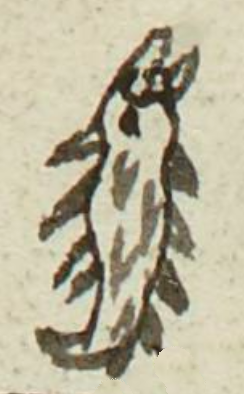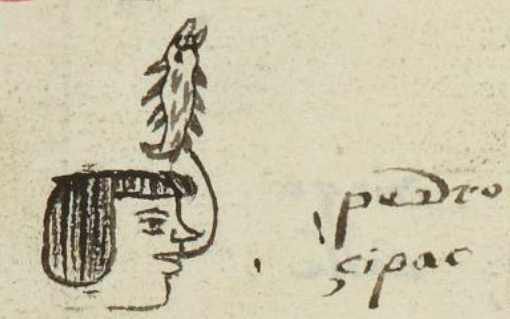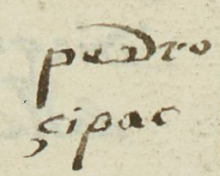Cipac (MH622r)
This black and white drawing of the glyph for the personal name Cipac ("Crocodile," attested here as a man's name) shows the animal in a vertical position with its mouth open. Its body is spiny or spiky.
Stephanie Wood
Cipactli was a day sign that comes from the tonalpohualli, the 260-day divinatory calendar. Calendrics figure importantly in Nahuas' religious views of the cosmos. The thirteen-day cycle that was started by One-Cipactli was an auspicious time to be born according to a downloadable publication hosted by Mexicolore.
Because of colonial edicts to stop using the tonalpohualli as a source for names, one thing this may have encouraged is the dropping of the companion numbers (1 to 13) were dropped, perhaps as a stopgap measure to reduce the sacred nature of the name. It might also have been a gradual fading of a tradition. See Norma Angélica Castilla Palma, "Las huellas del oficio y lo sagrado en los nombres nahuas de familias y barrios de Cholula," Dimensión Antropológica v. 65 (sept.-dic. 2015), 186.
Stephanie Wood
peDro
çipac
Pedro Cipac
Stephanie Wood
1560
Jeff Haskett-Wood
cocodrilos, calendarios, tonalpohualli, nombres de días, fechas, caimanes, nombres de hombres, cipac, cipactli, cocodrilo

cipac(tli), crocodile, caiman, alligator, https://nahuatl.wired-humanities.org/content/cipactli
Cocodrilo
Stephanie Wood
Matrícula de Huexotzinco, folio 622r, World Digital Library, https://www.loc.gov/resource/gdcwdl.wdl_15282/?sp=326st=image.
This manuscript is hosted by the Library of Congress and the World Digital Library; used here with the Creative Commons, “Attribution-NonCommercial-ShareAlike 3.0 License” (CC-BY-NC-SAq 3.0).









